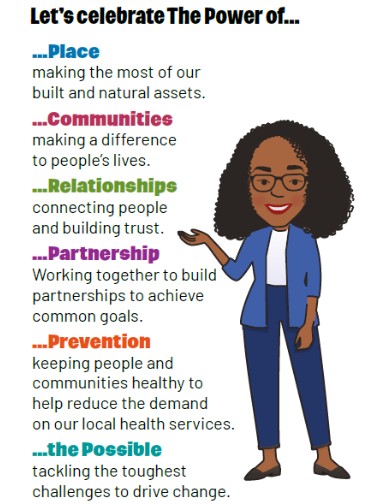2024 – The Power of People and Place: Celebrating and inspiring community-based wellbeing
This year’s report focuses on the importance of assets (people and the built and natural environment) for community wellbeing. This report is a celebration of our residents and the places in Warwickshire, showcasing some examples of how communities have come together and how our natural and built environment have been utilised to promote and support good health and wellbeing.
The report concludes with a set of recommendations from Director of Public Health, Dr Shade Agboola. These have been shaped alongside partners, to highlight and amplify work that is already underway across the Warwickshire system and to facilitate discussions and decisions that accelerate activity to support community health and wellbeing.
For the first time, this year’s report will be presented as a mixed media video with the aim of making the content accessible and allow the audience to visualise some of the valuable assets we have in Warwickshire. A short Executive Summary report accompanies the video. This includes an overview of the health and wellbeing of the Warwickshire population and information on progress with the 2023 recommendations.
Director of Public Health annual report 2024 videos
Full report
Trailer and chapters
- Trailer
- Chapter 1 - Introduction
- Chapter 2 - What builds a community?
- Chapter 3 - Why is community based wellbeing important?
- Chapter 4 - Case studies
- Chapter 5 - Summary and recommendations
Executive summary and appendices
- Director of Public Health annual report 2024 - The Power of People and Place: Celebrating and inspiring community-based wellbeing - Executive Summary report (PDF, 1.8MB)
- Appendix 1: References, 2024- The Power of People and Place: Celebrating and inspiring community-based wellbeing (PDF, 466KB)
- Appendix 2: Find out more, 2024 - The Power of People and Place: Celebrating and inspiring community-based wellbeing (PDF, 503KB)
Previous Director of Public Health annual reports
View the Director of Public Health annual reports from previous years
